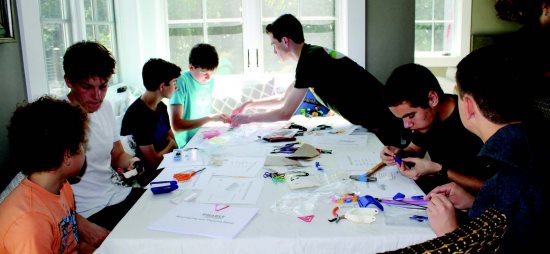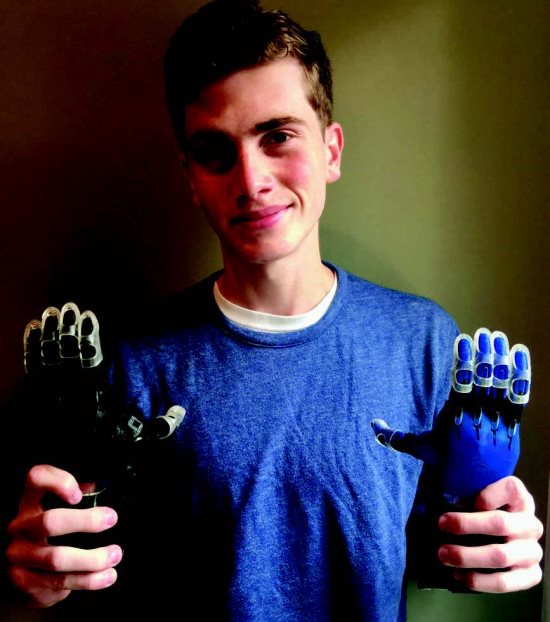
| ||||||
Caiden's project was training other scouts to assemble 10 3D-printed prosthetic hands for children. Caiden trained three other 17-year old scouts to assemble the parts, which were 3D printed by other volunteers, using fishing line on a tensioner pin. At an open house at Anderson's home, 10 other scouts from his troop, 303, spent many hours assembling the hands, which will be sent back to e-NABLE for distribution at no charge to children who need them.
The hands are complex; each one takes three to four hours to assemble. The 3D printing for each hand takes 26 hours.
Anderson was initially inspired by a story in the Lamorinda Weekly about the Rotary LN-4 project, which provides prosthetic hands, and through internet research he found e-NABLE, a global network of volunteers who are using their 3D printers, design skills and personal time to create free 3D printed prosthetic hands for those in need - with the goal of providing them to underserved populations around the world. Anderson had always been interested in building things that move and change, and really wanted to help someone. Last summer he interned for Humanity United working on the problem of human trafficking.
The type of prosthetic hand that Anderson and his troop assembled contains no electronic elements. Recipients must have to have a functional arm all the way down just below the wrist.
According to Jen Owen of e-NABLE, the hands are body powered. They are not implanted in any way and do not require surgery. They are strapped to the limb via Velcro, leather or other fabrics, lined with medical grade foam padding and are powered by the individual physically by bending their elbow or wrist. As far as Food and Drug Adminstration medical device regulation goes, it is believed not to apply because the prosthetics fall into the premarket category, because the design files and the built prosthetics are given away for free, according to e-NABLE's Ivan Owen.
Children who require prosthetic hands may require a new hand every year as they grow. This can be a tremendous financial burden on families. Standard prosthetic hands may cost from $10,000 to $15,000. The printed parts provided by e-NABLE volunteers cost about $50, and the stringing costs about $20 for a total cost of about $70. The completed hands are provided to recipients free of charge. The hands come in all different colors, so kids can make requests. In some cases, the volunteer can be connected to a specific child to provide new prosthetics as the child grows.
Since the inception of the Eagle Scout program in 1912, there have only been about two and a half million boy scouts who have risen to the level of Eagle Scout, less than one percent of the population. Anderson, 17, is currently a life scout. The Eagle Scout project is a leadership project, so the candidate can only do 30 percent of the actual work. Upon completion of the project, it must be submitted to a review board. Upon approval of the project, and having fulfilled all the other requirements including earning 21 merit badges, the candidate becomes an Eagle Scout, a rank he holds for the rest of his life. Some famous Eagle Scouts include Astronaut Neil Armstrong, Supreme Court Justice Stephen Breyer, President Gerald Ford, and movie produced Steven Spielberg.
The Lamorinda Weekly is proud to feature local Eagle Scouts on our Service to the Community page. If your troop has Eagle Scouts, send a photo with a write-up of up to 250 words about the scouts.

Reach the reporter at:
